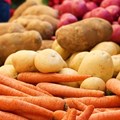AfDB approves $1.5bn emergency food facility

The funding is meant to assist Africa overcome a shortage of at least 30 million metric tonnes of food due to the disruption of global food supplies caused by the conflict in Europe, especially for wheat, maize and soybeans imported from Russia and the Ukraine.
The facility was designed to boost the local production of cereals and oil grains as the most effective and efficient way to build resilience across Africa's food systems, the bank said.
"African farmers urgently need high-quality seeds and inputs before the planting season begins in May to immediately boost food supplies," the bank says.
Building resilient Africa food systems
The African Emergency Food Production facility will provide 20 million African smallholder farmers with certified seeds. It will increase access to agricultural fertilisers and enable them to rapidly produce 38 million tonnes of food. This is a $12bn increase in food production in just two years.
African Development Bank Group president Dr Akinwumi Adesina says: "Food aid cannot feed Africa. Africa does not need bowls in hand. Africa needs seeds in the ground, and mechanical harvesters to harvest bountiful food produced locally. Africa will feed itself with pride for there is no dignity in begging for food."
The facility has benefited from stakeholder consultations, including those with fertiliser producers and separately with African Union agriculture and finance ministers earlier this month.
The ministers agreed to implement reforms to address the systemic hurdles that prevent modern input markets from performing effectively.
The price of wheat has soared in Africa by over 45% since the war in Ukraine began. Fertiliser prices have gone up by 300%, and the continent faces a fertiliser shortage of 2 million metric tonnes. Many African countries have already seen price hikes in bread and other food items. If this deficit is not made up, food production in Africa will decline by at least 20% and the continent could lose over $11bn in food production value.
The African Development Bank’s $1.5bn strategy will lead to the production of 11 million tonnes of wheat; 18 million tonnes of maize; 6 million tonnes of rice; and 2.5 million tonnes of soybeans.
The facility will provide 20 million farmers with certified seeds, fertiliser, and extension services. It will also support market growth and post-harvest management.
The AfDB will provide fertiliser to smallholder farmers across Africa over the next four farming seasons, using its convening influence with major fertiliser manufacturers, loan guarantees, and other financial instruments.
The facility will also create a platform to advocate for critical policy reforms to solve the structural issues that impede farmers from receiving modern inputs. This includes strengthening national institutions overseeing input markets.
Source: Reuters

Reuters, the news and media division of Thomson Reuters, is the world's largest multimedia news provider, reaching billions of people worldwide every day.
Go to: https://www.reuters.com/About Wendell Roelf
Reporting by Wendell Roelf; Editing by James Macharia Chege.Related
South Africa grants Eskom coal plants limited emissions exemptions 1 Apr 2025 EIB reviews financing for $760m hydro project over DRC war 14 Mar 2025 SA urges G20 to embrace Ubuntu for global solidarity in agriculture 5 Mar 2025 How innovation and sustainability can solve Africa's food security challenges 4 Mar 2025 AfDB, Standard Bank partner for R3.6bn SMME funding and trade growth 26 Feb 2025 Advancing Africa's agriculture: Tackling nutrient efficiency, sustainability, and innovation 24 Feb 2025

























